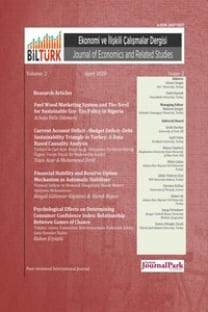The Relationship between Crude Oil Prices, Real Effective Exchange Rate and Terms of Trade: A Causality Analysis for Turkey
Çalışmada reel efektif döviz
kuru, petrol fiyatları ve net dış ticaret hadleri arasındaki ilişki
incelenmiştir. Dış ticaretin gelişmesiyle birlikte artan açıklık oranları
nedeniyle ülkeler birbirlerine daha çok bağımlı hale gelmiştir. Ülkeler yatırım
mallarını ithal edebilmek için ihracattan kaynaklanan gelirlerini arttırmak
zorundadır. Bu nedenle uluslararası pazarlarda ihracatta rekabetçiliğin önemi
artmaktadır. Dış ticaret hadleri uluslararası ticaret sonucu elde edilen
gelirlerin ticarete katılan ülkeler arasında nasıl paylaşıldığını
göstermektedir. Dış ticaret hadlerindeki bir iyileşme dışarıdan içeriye doğru
bir gelir transferini sağlamaktadır. Dış
ticaret politikalarındaki değişiklikler, döviz kurlarındaki dalgalanmalar,
devresel dalgalanmalar gibi arz ve talepte meydana gelen yapısal değişmeler
ihracat ve ithalat fiyatları yolu ile dış ticaret hadlerini değiştirir. Reel
döviz kuru talep; petrol fiyatları da
arz koşullarını etkileyen en önemli faktörlerdendir. Bu nedenle çalışmada
Türkiye 2010-2017 dönemi için petrol fiyatlarının ve reel döviz kurunun net dış
ticaret hadlerine etkisi araştırılmıştır. İncelenen dönemde elde edilen
sonuçlar; ham petrol fiyatlarının net dış ticaret hadlerinin nedeni olduğunu
ortaya koyarken reel efektif döviz kuru ile net dış ticaret hadleri arasında
nedensellik ilişkisi olmadığını göstermiştir.
Anahtar Kelimeler:
Dış Ticaret Hadleri, Reel Efektif Döviz Kuru, Petrol Fiyatları, Nedensellik Analizi
In this study, the relationship between real
effective exchange rate, oil prices and the net terms of trade is examined.
Countries have become more interdependent on each other because of the
increasing openness rates. In order to import investment goods, countries
must increase their revenues from exports. The terms of trade shows how
international trade revenues are shared among the countries participating in
the trade. An improvement in terms of trade leads to an inward transfer of
income from the rest of the world countries. Changes in foreign trade
policies, fluctuations in exchange rates, structural changes in supply and
demand conditions affects the terms of trade by means of export and import
prices. Real exchange and oil prices are the most important factors affecting
demand and supply conditions respectively. Therefore, the effect of oil
prices and the real exchange rate on the net terms of trade of Turkey have
been researched for the period between 2010 and 2017. The results reveal that
crude oil prices are the cause of the net terms of trade. On the other hand,
there is no bilateral causality relationship between the real effective exchange
rate and the net terms of trade.
Keywords:
Causality, Terms of trade, Real effective exchange rate, Oil prices,
___
Aipi, B. (2012). Determinants of Real Exchange Rate in Papua Guinea. Working Paper(4).Bhagwati J.N. (1958), “Immiserizing Growth: A Geometrical Note”, Review of Economic Studies, 3, 201-5.
Backus, D. K. ve Crucini, M. J. (2000). Oil Prices and The Terms of Trade. Journal of International Economics, 50, 185–213.
Baldemir, E. ve Gökalp (1995). Türkiye’de döviz kuru ve dış ticaret hadleri ilişkisinin ekonometrik analizi. IV. Ulusal Ekonometri ve İstatistik Sempozyumu Bildirileri, (s. 17-40).
Çalışkan Çavdar, Ş. (2011). e-Journal of New World Sciences Academy, 6(4).
Dickey, D. A. ve Fuller, W. A. (1981). Likelihood Ratio Statistics for Autoregressive Time Series with a Unit Root. Econometrica, 49(4), 1057-1072.
Diler, H. G. (2006). Reel Döviz Kurları-Dış ticaret Hadleri İlskisi, Türkiye Üzerine Bir Uygulama. Afyonkarahisar: Afyon Kocatepe Üniversitesi Sosyal Bilimler Enstitüsü.
Dornbusch, R. (1980). Exchange rate rules and macroeconomic stability. NBER Working Papers, 473, 1-24.
Dungey, M. (2004). Identifying terms of trade effects in real exchange rate movements: evidence from Asia. Journal of Asian Economics, 15(2), 217-235.
Enders, W. (2010). Applied Econometric Time Series Third Edition. New York: John Wiley.
Enrique, G. ve Mendoza. (1995). The Terms of Trade, The Real Exchange Rate and Economic Fluctuations. International Economic Review, 36(1).
Granger, C. (1969). Causal Relations by Econometric Models and Cross-Spectral Methods. Ekonometrica, 553-560.
Granger, C. (1988). Causality, Cointegration and Control. Journal of Economic Dynamics and Control, 551-559.
Güneş, S., Gürel, S. P. ve Cambazoğlu, B. (2013). Dış Ticaret Hadleri, Dünya Petrol Fiyatları ve Döviz kuru İlişkisi Yapısal VAR Analizi: Türkiye Örneği. Uluslararası Yönetim İktisat ve İşletme Dergisi, 9(20).
IMF. (2018). 2018 tarihinde https://www.imf.org/en/Data adresinden alındı
Keskin, Ş. (2009). Döviz Kuru Politikaları - Dış Ticaret Hadleri İlişkisi: Türkiye Uygulaması (1984-2007). Yüksek Lisans Tezi. içinde Kütahya: Dumlupınar Üniversitesi Sosyal Bilimler Enstitüsü.
Korhonen, L. A. ve Ledyaeva, S. (2010). Trade linkages and macroeconomic effects of the price of oil. Energy Economics, 32, 848–856.
Maravelle, A. (2012). Oil shocks and the US terms of trade: gauging the role of the trade channel. University of the Basque.
Mirfacihi, A. ve Andersson, A. E. (2006). Oil Prices and Terms of Trade: A comparison Between. Jönköping University.
Özgen, F. B., & Güloglu, B. (2004). Türkiye'de iç borçlarin iktisadî etkilerinin VAR teknigiyle analizi. METU Studies in Development, 31, 93-114.
Rahman, M. ve Mustafa, M. (2012). Cointegration and Causality Between U.S Terms of Trade and External Value of Dollar Under The Floating Exchange Rate System.
Serin, N. (1981). Kalkınma ve Dış Ticaret. Ankara: Ankara Üniversitesi SBF Yayınları.
Sevim, C. ve Doğan, T. T. (2016). Türkiye Ekonomisinde İhracat ve Döviz Kuru Oynaklığı İlişkisi. Ege Akademik Bakış, 16(2), 303-318.
Türkiye Cumhuriyet Merkez Bankası. (2018). 2018 tarihinde TCMB: https://evds2.tcmb.gov.tr/ adresinden alındı
Türkiye İstatistik Kurumu. (2018). 2018 tarihinde www.tuik.gov.tr. adresinden alındı
Yapraklı, S. (2006). Türkiye'deki Dış Ticaret Fiyatları ile Reel Döviz Kuru Arasındaki İlişki: Ekonometrik bir Analiz. H.Ü. İktisadi ve İdari Bilimler Fakültesi Dergisi, 24(1), 69-87.
Zengin, A. (2000). Reel Döviz Kuru Hareketleri ve Dıs Ticaret Fiyatları(Türkiye Ekonomisi Üzerine Amprik Bulgular). C.Ü. İktisadi ve İdari Bilimler Dergisi.
- Yayın Aralığı: Yılda 4 Sayı
- Başlangıç: 2019
- Yayıncı: Fatih DEYNELİ
